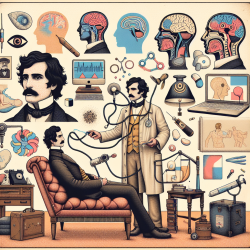Unlocking the Secrets of Leon Pierce Clark's Contributions to Epilepsy
In the world of speech-language pathology and therapy, making informed, data-driven decisions is crucial for achieving the best outcomes for children. One way to enhance our understanding and improve our practice is by exploring historical contributions to the field of neurology and psychiatry. A fascinating figure in this regard is Leon Pierce Clark, an American neurologist and psychiatrist, whose work on epilepsy in the early 20th century offers valuable insights for modern practitioners.
Who Was Leon Pierce Clark?
Leon Pierce Clark (1870–1933) was a prominent figure in the study of epilepsy. He focused on the psychological mechanisms of epilepsy and the personality traits of those with idiopathic epilepsy, interpreting these from a psychoanalytical perspective. His work was pioneering, and he held numerous positions in American professional societies, although his career was not without controversy.
Key Contributions
Clark's contributions to the field are manifold, but several stand out:
- Psychoanalytical Perspective: Clark was one of the first to apply psychoanalytical concepts to epilepsy, which was groundbreaking at the time. This approach can inspire modern therapists to consider psychological and emotional factors in treatment plans.
- Epileptic Voice Sign: He described the "epileptic voice sign," a characteristic vocal pattern observed in some individuals with epilepsy. Recognizing such signs can be crucial for speech-language pathologists in diagnosing and tailoring interventions.
- Psychobiographies: Clark wrote psychobiographies of historical figures like Abraham Lincoln and Napoleon Bonaparte, exploring the intersection of personality and neurological conditions. This work underscores the importance of understanding the individual holistically.
Implementing Clark's Insights in Modern Practice
How can today's practitioners use Clark's insights to improve their practice? Here are a few suggestions:
- Holistic Approach: Embrace a holistic approach to therapy that considers both psychological and neurological aspects. This can lead to more comprehensive and effective treatment plans.
- Focus on Communication: Pay attention to vocal characteristics and communication patterns in clients with epilepsy. This can provide additional diagnostic information and help tailor speech therapy interventions.
- Encourage Further Research: Clark's work highlights the importance of continuous research and exploration. Encourage practitioners to delve deeper into historical and current research to inform their practice.
Conclusion
Leon Pierce Clark's contributions to the understanding of epilepsy and its psychological aspects offer valuable lessons for modern practitioners. By integrating his insights into our practice, we can enhance our ability to provide effective, data-driven therapy that addresses the needs of the whole child.
To read the original research paper, please follow this link: The enigmatic figure of Leon Pierce Clark and his contribution to epilepsy.










